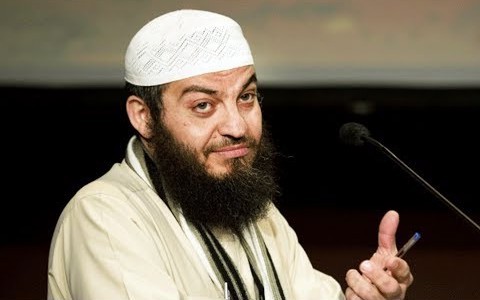Not ‘poisonous and pernicious’ enough?
by - 21st August 2015

EARLIER this year radical preacher Haitham al Haddad launched a legal claim against this website in relation to a previous Lapido Media article.
We were forced to remove the article from our website. We are nonetheless prepared to continue holding extremist speakers such as Mr Haddad to account.
Since we documented the incendiary language used by Mr Haddad, the preacher has continued to post online video sermons on matters of Islamic jurisprudence on the islam21c.com website - a project run by a group called the Muslim Research Development Foundation.
But a cursory check of his recent online activity shows up no evidence of him repeating well-publicised hard-line opinions on female genital mutilation, homosexuals and domestic violence - the type of views which made him the subject of investigations by journalists at the BBC and Channel 4.
Similarly Mr Haddad appears to have slowed his appearances on the university debating circuit - despite having told us in a legal letter in April that ‘he remains a very active university speaker on a range of matters’.
According to recent reports Mr Haddad has had a harder time finding a platform at some universities.
In February 2,250 people signed a petition started by the LGBTI Society calling on the University of Westminster to prevent the cleric from speaking on campus.
The event was eventually postponed ‘due to increased sensitivity and security concerns’ according to a report by anti-extremism on campus group, Student Rights.
And in March an event at the University of Kent's Canterbury Campus at which he was due to speak was ‘axed’ amid concerns about extremism.
Arrests
During the same period other radicals Anjem Choudary and Mizanur Rahman have been charged with inviting support for the terrorist group ISIS and are now awaiting trial.
Add to this, last month Prime Minister David Cameron set out his ‘full-spectrum response’ to the terrorist threat facing Britain less than two weeks after the tenth anniversary of the 7/7 attacks in London.
The PM urged broadcasters to give more airtime to moderate Muslims and promised funding and ‘protection and political representation’ to UK Muslim groups that demonstrated an adherence to British values.
In the same speech Mr Cameron accused some segments of the Muslim community of ‘quietly condoning’ Islamist ideology and universities of failing to challenge ‘creeping extremism’.
Could it be that new rules proposed by Home Secretary Theresa May - following a speech she gave in March telling radical Islamists the ‘game is up’ - are behind the latest prosecutions of Mr Choudary and Mr Rahman, and the recent silence of Mr Haddad?
Embarrassing
But what of Mr Haddad’s previous statements? A trawl through some of his speeches online including some featured on investigations carried out by the BBC and Channel 4 suggests some of his opinions might yet land him in hot water.
As a former trustee of the Muslim Development and Research Foundation (MRDF), Mr Haddad was trusted with promoting the charity's call for 'facilitating Muslims in furthering their knowledge’.
But a search through his online history shows Mr Haddad expounding a version of ‘Islamic knowledge’ some students of Islam may find embarrassing.
 In a programme entitled, ‘The Battle for British Islam’ screened after the Paris terror attacks earlier this year by BBC's Panorama, Mr Haddad told his followers they needed to engage with Britain's ‘filthy’ democratic system if they hope to affect a change in the country.
In a programme entitled, ‘The Battle for British Islam’ screened after the Paris terror attacks earlier this year by BBC's Panorama, Mr Haddad told his followers they needed to engage with Britain's ‘filthy’ democratic system if they hope to affect a change in the country.
He says, in a discourse designed to get Muslims to engage with democracy for Islamic purposes: ’So whether you like it or you don’t like it, the political participation is, or the political process is the scene to influence a change. I know it is filthy, OK? I know all the kuffar will go to hellfire. I know all the kuffar hate Muslims.’
And during an examination of his role as a judge at London's Islamic Sharia Council, Haddad was quizzed on his views concerning domestic violence by Channel 4.
The Saudi preacher explained: ’A man should not be questioned why he hits his wife - because this is something between them.’
The cleric goes on to explain to the broadcaster that his views are not extreme and merely represent 'mainstream Islam'.
And in another video lecture posted online by the MRDF, Mr Haddad describes the barbaric practice of female genital mutilation (FGM) as a 'virtue' for women - but only if it is carried out in the 'proper' way.
He says here: ‘It is the consensus of all the scholars that female circumcision is Sunnah (proper).
Twisted
In addition, Haddad's views are clear in this recent video address for Islam21C - the 'flagship website' of the MRDF - where Haddad warns his supporters that press reports concerning atrocities by ISIS terrorists are nothing more than a conspiracy.
He claims here: ‘There is a big conspiracy around this ISIS and what is the agenda behind it?
‘It is a big conspiracy and (the) future will prove this.
‘Even the clips of killing the American captives or the British captives etc etc . . . there is still a big conspiracy around this.’
When asked by Lapido Media about Mr Haddad's activities, the Home Office said they could not comment on individual cases but gave us the following statement outlining their plans on fighting extremism in the coming months.
They added that the new 'Prevent duty' - which came into effect on 1 July - is concerned with ‘protecting people from the poisonous and pernicious influence of extremist ideas that are used to legitimise terrorism’.
A spokesman added: ‘This Government is committed to defeating extremism in all its forms.
‘The forthcoming counter-extremism strategy will improve our understanding of extremism, promote our shared values and strengthen communities to confront the twisted extremist ideologies that promote hatred and cause division.
'The strategy will include legislation to deal with the most active and persistent extremist groups and individuals and the premises they use to spread their influence.'
Mr Haddad did not respond to request for comment.
